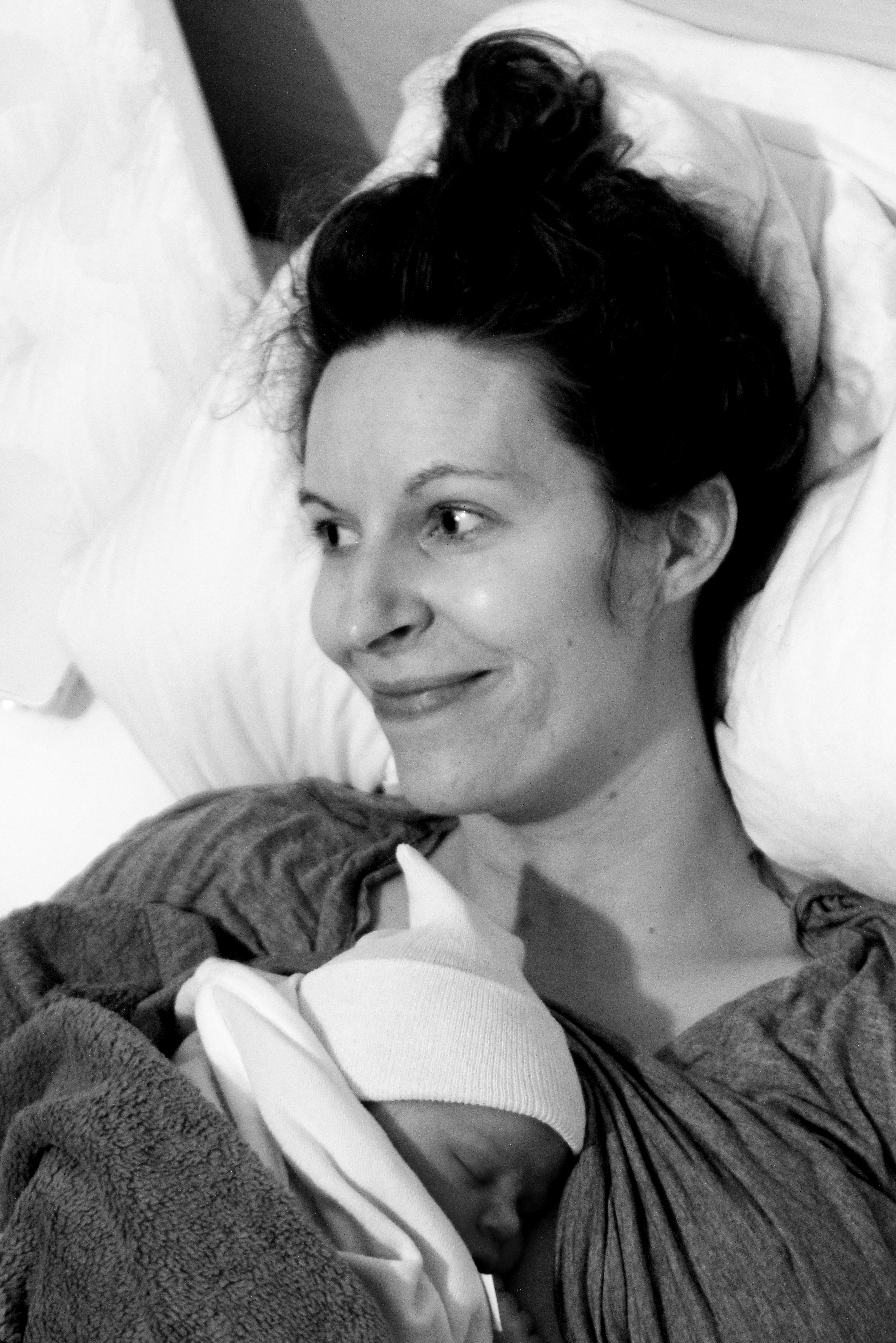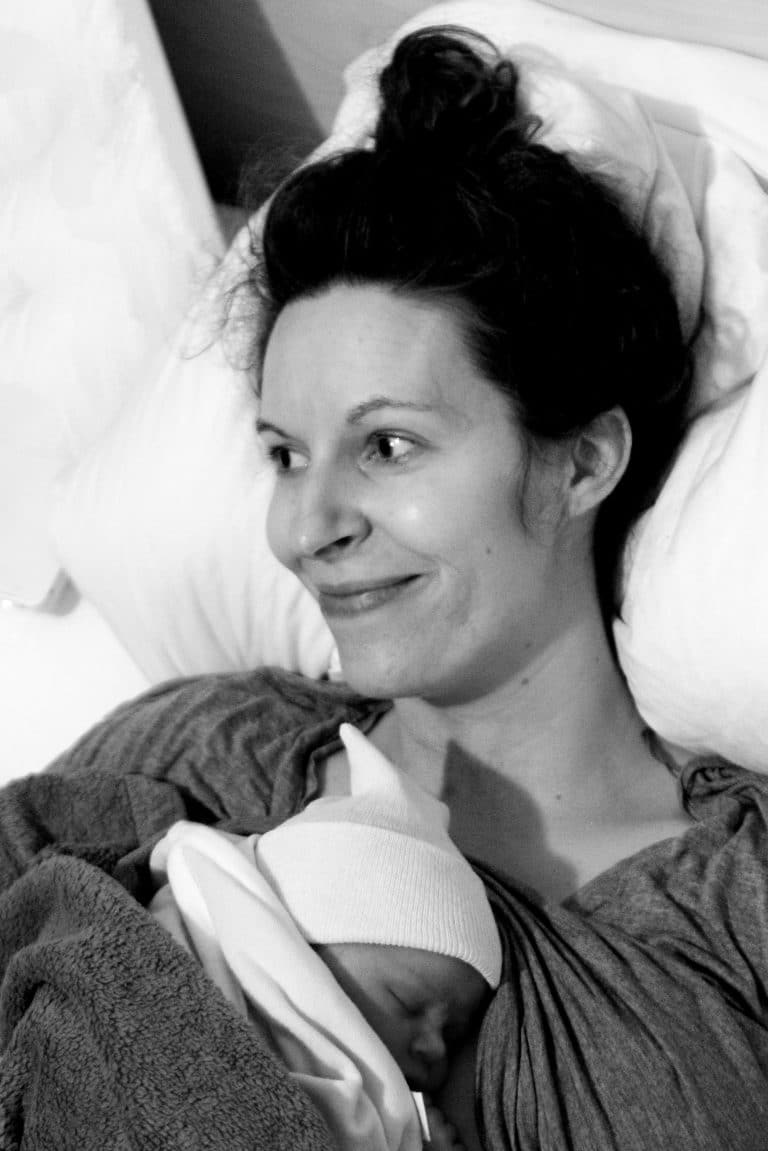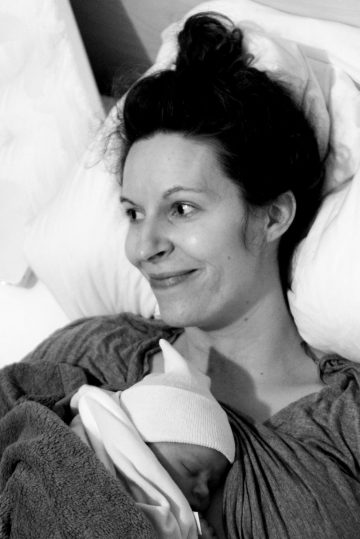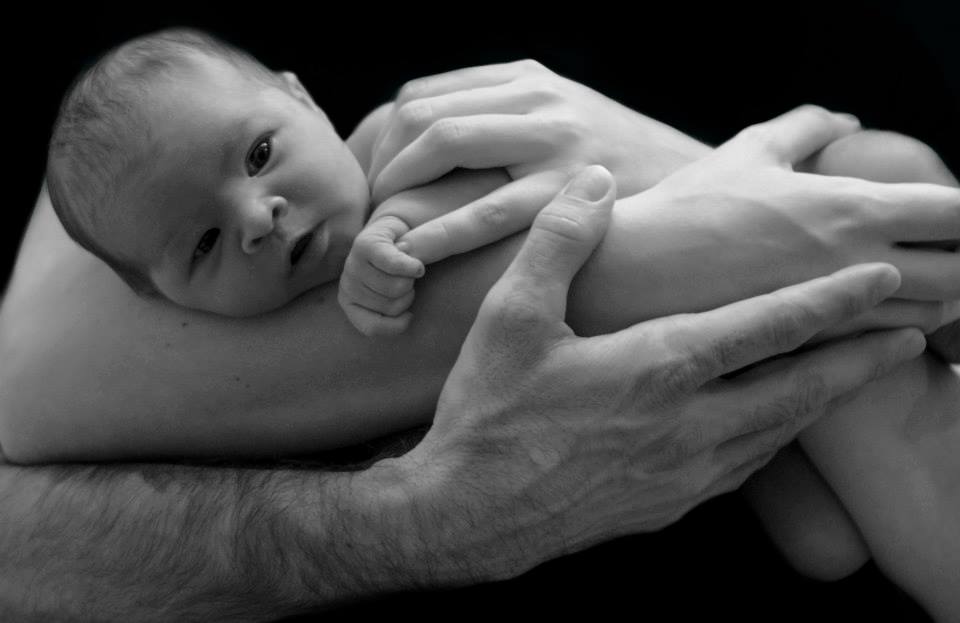One of the first times someone asked me to recount my daughter’s birth, I started to speak, and then without meaning to, I started to weep. It was difficult to remember something that was so tender to live.
The contractions started on a Thursday afternoon, when the only thing I wanted was to take a nap. I lay in my bed with my eyes closed. One surge came, and then another, every ten minutes. Each lasted approximately 1 minute and 15 seconds. I could feel them grow. They became easier to manage if I stood or walked. At their end, I would climb back into my bed. I called my husband, Spencer, after about two hours of this. He was at work. I asked him to come home soon–though not necessarily immediately–and to please pick up grapes on the way. However, the next contraction was so forceful that it made me throw up. I called him back and said, “Actually I need you to come home right now.”
It took him about an hour: one because he actually bought the grapes, and two because he needed to finish something at his office. I continued to move through each contraction, but they were getting closer together, making them braver to bear alone. My body’s temperature also started to oscillate: When I was experiencing a contraction I was very hot. Otherwise I was very cold. At Spencer’s arrival I was sitting on the couch, downloading the songs we danced to the day(s) we got engaged, and playing Duolingo and Tetris (badly). He greeted me, and then began setting up the birth pool. He didn’t want me to get in it quite yet, in case I was still in early labor, but he did want it to be ready.
I took a series of hot showers, and doused my back and abdomen with peppermint essential oil. When not in the shower, I made Spencer slow dance with me to fast songs. It allowed him to put ample pressure on my back. I needed pressure on my abdomen too, but that was trickier for him to help with. I also tried to eat more food, but could not keep it down. Neither could I keep down gatorade nor coconut water: I could only manage tiny sips of plain old water. During individual contractions I tried to implement the strategies I read about in Ina May’s Guide to Childbirth, including loud, low breathing, rhythmic motion, singing, braying, and making out.
Soon contractions were 5 minutes apart, and while Spencer was offering kind words and even kinder back support, I needed the care and support of women. We called our doula, Aunika, and one of our midwives. Neither seemed to understand how quickly my labor was progressing, but because I said, “Please come,” the former got in her car and began driving. It would still be some time before she arrived, because she was coming to New York City from a state away. The latter wanted to listen to me breathe through a contraction. Afterward she suggested that a good project would be for me to get in the pool. I did so, while Spencer continued to put pressure on my back.
The apartment was darker now, with the sun’s fall, and it felt soothing. I had also taken off my glasses. It was better not to see things sharply; more dreamlike. The same song played on repeat.
Spencer received a call from our doula that she was close, but lost, and her phone was dying. He ran outside to find her. I tried not to be afraid. My contractions were measuring 1 1/2 minutes, approximately 2 minutes apart, leaving me no more than 20 or 30 seconds of precious rest. (The books made me think that I would have more.) He came back to check on me, and then ran out again. I sat in the birth pool, wondering if I would ever be brave enough to have a second child/if I was brave enough to have a first. I also understood then why some women choose elective c-sections and many others choose epidurals.
More contractions passed, and then the door opened: our doula! She was the most welcome sight. Soon she knelt beside me and asked how I felt I was doing. I just kept shaking my head. She asked me again. Finally I whispered that I was not sure why I ever thought it was a good idea to give birth at home, without medication. She placed her hands gently, but firmly upon my shoulders, and looked me in the eyes. “Rachel,” she said, “You can do this.” It was simple, and a little silly, but I believed her. She had been at births before–including her own–and her voice was steady and strong. She breathed with me until my breaths were calm again, and low. She helped me get into a better position in the pool. I was leaning over the edge now, with my arms somewhat folded. My legs were opened wide, with my inner thighs pressed against the pool in a deep squat. I rocked back and forth into the contractions.
At each one’s close, I would pull away from the pool’s edge, but sometimes continued rocking. I signaled each new contraction by uttering, “Oh gosh,” and physically repositioning myself. With Aunika’s encouragement I would often add, “I welcome you,” or “I can’t wait to meet you, Cora.” Both she and Spencer would say similar, encouraging words, but it was difficult for me to concentrate on two voices. I often asked Spencer to be quiet, because Aunika’s tone was calmer. (Spencer felt excited, and spoke a tad too exuberantly.)
I remember Aunika telling me that she loved the way I was breathing, and that I was doing a great job. One time she felt prompted to say that the way I was giving birth was similar to the women I study. I thought of my Mormon forbears, including Patty Sessions, Emma Smith, and my mother. It strengthened me more than my doula could have known. And, even in the midst of immense pain, it made me smile. Occasionally I remembered words or ideas that I had read, like “It is possible to give birth,” and “I’m going to get huge,” as well as how contractions could not be more powerful than me, because they were me. Other times I remembered nothing at all.
I started going between the birth pool and bathroom every few surges, and soon felt the urge to push. (I remember thinking that it was real, but different than I imagined.) Whereas an earlier period made me question why I chose to birth at home, this period made me extremely grateful that I did. I had read that toilet seats can be wonderful places to push, because they are the only space in everyday life where we relax the muscles necessary. It was comforting to push on my own toilet, in my own restroom. This was particularly true because pushing was difficult for me. It was a struggle to keep my breathing low. Aunika mirrored more helpful breaths, but mine sometimes still came out like cries. Spencer remained close, exerting strong pressure on my back. I leaned forward to grasp a nearby pole.
My first midwife arrived in the midst of this, and quickly placed her doppler on my belly to ensure my baby was not distressed. Thankfully, her vitals were perfect. Liquid squirted out of me seconds later, and Spencer exclaimed that my water broke. Around that time, I felt the burn. A few contractions passed, and my daughter’s head began to crown. My midwife asked me where I wanted to have the baby, suggesting the pool, the bed, or the floor outside of the bathroom. I didn’t understand: I wanted to have her right there, simply because I did not want to move. She asked again. I reluctantly answered “pool,” and began the difficult work of standing up.
Together Spencer and Aunika helped support me/half carried me the few feet while I opened my legs wide and shuffled as well as I could. They lifted me over the pool’s edge, and I knelt on my hands and knees during a few more, burning contractions. Someone announced that my daughter’s head was fully crowned. Spencer reached down and felt it before crying, “She has hair!” It made me smile a big smile, but it also made me ask him not to touch her anymore, because I could feel it. That is when my second midwife arrived. I was vaguely aware of her presence, but couldn’t focus on it; I was deep in that liminal land of labor.
I was praying very, very hard during this time, because I needed my baby’s body to follow quickly. I pictured a friend’s birth video that showed exactly that, and pleaded with Heavenly Father to sustain me. I also prayed to feel the love and support of my Heavenly Mother, and for my deceased grandparents to be close. A few more contractions passed before the first part of my prayer was answered: my daughter slid right out. I felt it, but needed confirmation that it was really over. Someone told me that Spencer caught her, and was holding her. I was relieved and overjoyed, but could not turn around. I had nothing left. Strong women reached in to lift me over the umbilical cord, until I faced my daughter.
She was so pretty, and so slippery; I was nervous that I would drop her in the pool when Spencer handed her to me. She was also red cheeked, and had no visible vernix on her, which surprised us. She let out a tiny, hearty cry, but was calm immediately after.
I had forgotten about the placenta, and was troubled when I remembered it. Everyone assured me that it would be easier: it didn’t have bones. I don’t remember how I got to the couch, but I do remember sitting there while a midwife examined me. The placenta came right out. I didn’t feel the contraction. What I did feel soon after was my entire body shaking. It made me surprised and a little scared. My birth team told me it was normal because of the adrenaline. And the hormone changes. And the throwing up. My doula brought me a spoonful of honey before making me a grilled sandwich. I didn’t feel hungry yet, but everyone insisted that I eat. One of my midwives also fed me grapes–the very ones Spencer purchased on his way home–and they were delicious.
 I tore in three places and was sewn together again. (It felt almost braver than the birth, despite my midwife’s competency.) When things were still, I sang my daughter the songs I sang her in the womb, and cried as I welcomed her into my family. We fell asleep together in our own bed, and it was perfect. (The birth lasted for 8 hours and 40 minutes, exactly.)
I tore in three places and was sewn together again. (It felt almost braver than the birth, despite my midwife’s competency.) When things were still, I sang my daughter the songs I sang her in the womb, and cried as I welcomed her into my family. We fell asleep together in our own bed, and it was perfect. (The birth lasted for 8 hours and 40 minutes, exactly.)
…
For me the best part of having a baby at home is that we were home. The second best part of having a baby at home is that it made our home sacred. The third is that I felt (mostly) cared for.
Sometimes when I looked at my baby in those first few days, the only thing I could think was, “The hardest thing I have ever done was for you.” And then I would start to cry.
She was born out of my vulnerability and strength.







35 Responses
This is so beautiful – it made me cry! I love these stories precisely because they show us examples of just how strong we can be. What a beautiful story, Rachel!
I love birth stories also, and am grateful that you read this one. I look forward to hearing more about your thoughts/experiences as a doula!
You write so beautifully! Thank you for sharing how Cora came into the world and how you did the hardest thing you will ever do for the one you love most.
Thank you, Ayesha. And you are very welcome.
Oh rachel, thank you for sharing your beautiful story. I love that we all get to have our own stories, both of coming into the world and of helping others come into the world. Sure love you.
Thank you, dear Ashmae. I love that story fact too, and you!
I love you, Cora and this lovely birth story! Two powerful women working together to meet each other. Thank you for sharing with us.
Thank you, thank you, thank you. It really did feel like we were working together. You are of course, welcome.
Good work, Rach-ey ! — w/ the baby and the blog.
Thank you, Joey!
Thanks so much for sharing this story with us, Rachel. I’m particularly struck by your thought that the hardest thing you’ve done was for Cora. I’m impressed that you had the presence of mind to think of your foremothers during birth. I wanted natural childbirths because I wanted solidarity with my foremothers, but I wasn’t actually thinking of them or feeling any help or presence from anyone not actually in the room. For me birth wasn’t a spiritual experience, but I’ll always feel satisfaction when I think of how I did it using my own power and strength.
You are welcome, Emily U. I’m not sure now whether it really was (or is) the hardest thing that I have ever done. I’m only sure that it felt like it then.
I did feel strength from Mormon foremothers, and Wanted to feel strength from loved presences. (I think that longing alone helped me.)
my fellow rachel, thank you! this was beautifully written as was cora’s birth. we celebrate my son’s one year old birthday in two weeks and all i can do is reflect on his birth. your story brought me to tears and it was as if i could feel every contraction and burn that you described. birth is amazing. women are amazing. thank you exponent for this awesome series!
You are welcome, Rachel. 🙂 Happy soon-to-be-birthday to your son.
And birth and women really are amazing. I love this series, too. Every post has been golden.
What a beautiful (and beautifully-told!) story, Rachel! Thanks so much for sharing this.
Thank you, Ziff!
Truly beautiful. I’m so happy you shared this.
Thank you, Brooke.
[…] “whole time” came after my babe was born. I started again, and read a few pages at time, while I fed her. We finished just a few days ago, […]
[…] The first and only time I have given birth, I was lucky enough to be supported by a wise and capable doula, who said no shortage of encouraging and gentle words to me. They filled me with faith, courage, and memory, and helped me both move and breathe through birth. […]
[…] the photographs forcefully made me remember my own raw, vulnerable, and strong experience giving birth, and the hour, and day, and week after. So I could only stand there and […]